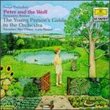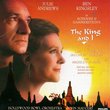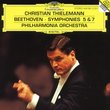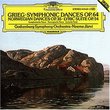| All Artists: Richard Strauss, Wolfgang Sawallisch, Eva Marton, Cheryl Studer, Symphonie-Orchester des Bayerischen Rundfunks, Chor des Bayerischen Rundfunks, Marjana Lipovsek, Bernd Weikl, Hermann Winkler, Kurt Moll, Victoria Wheeler, Dorothea Geipel, Ulrich Ress, Alfred Kuhn, Carmen Anhorn, Daphne Evangelatos, Shirley Close, Birgit Calm, Julia Faulkner, Caroline Maria Petrig Title: Strauss - Elektra / Marton · Studer · Lipovsek · Weikl · Winkler · Sawallisch Members Wishing: 1 Total Copies: 0 Label: Angel Records Release Date: 7/1/1991 Genre: Classical Style: Opera & Classical Vocal Number of Discs: 2 SwapaCD Credits: 2 UPC: 077775406726 |
Search - Richard Strauss, Wolfgang Sawallisch, Eva Marton :: Strauss - Elektra / Marton · Studer · Lipovsek · Weikl · Winkler · Sawallisch
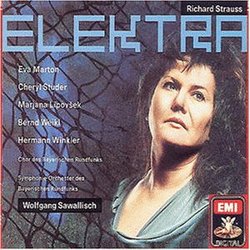 | Richard Strauss, Wolfgang Sawallisch, Eva Marton Strauss - Elektra / Marton · Studer · Lipovsek · Weikl · Winkler · Sawallisch Genre: Classical
|
Larger Image |
CD DetailsSimilarly Requested CDs |
CD ReviewsNot the best 09/10/2003 (4 out of 5 stars) "Eva Marton is one of today's top dramatic sopranos but she is not the best recorded Elektra. I think that even Hildegard Behrens is better than Eva Marton. Behrens has a more radiant top register compared with Marton. Nevertheless, this is a very good Elektra performance. This is one of only two truly complete recordings of Elektra. Only the Solti Elektra with Nilsson under Decca and this Elektra is complete - every single note is there. All other recordings have been cut (yes, that includes other studio recordings). I don't like this recording as much as Solti's. Firstly, Eva Marton is no match for Birgit Nilsson. Eva Marton's top B's and C's are not as good. Also, listen to the final monologue of Elektra in the Elektra-Klytamnestra Duet - Marton sounds like she is whispering. Her performance is very tame and this is not in keeping with the text. Here Elektra is supposed to be making all kinds of threats at Klytamnestra not whispering tame words at Klytamnestra. Birgit Nilsson on the other hand is all fury and ready to strangle Klytamnestra - exactly what the text requires. Cheryl Studer on the other hand is a superb Chrysothemis. Her performance is magnificent. Sawallisch is a very good conductor but the orchestra sounds very recessed in the recording. Perhaps the engineers dim the orchestra so that Marton can be heard? But that makes the sound somewhat artificial. At the end of the day, there are many other great performances of Elektra out there that you should sample before coming to this. Firstly, there is Birgit Nilsson's classic Elektra - absolutely stunning. Then there is Astrid Varnay's incredible Elektra in 1953 in super clear mono sound, almost like thin stereo. It was a studio recording made for broadcast - in other words it is a studio recording in superb sound. The Varnay set is available under Koch Schwann in Amazon. Priced at full-price it has the incomparable Leonie Rysanek as Chrysothemis in freshest and most thrilling voice. It is worth every cent and could match the Nilsson set in stereo!! It goes without saying that Varnay sings with more dramatic sense, more security of voice and more vocal heft than Marton. Strangely, the mono sound in 1953 is far better than this stereo digital in 1990, which makes you wonder whether at all recording technology has improved that much. Well, I suppose the technology has improved but the engineers or whoever does not seem to know how to use it to proper effect. Then you have Leonie Rysanek's Classic Elektra in the Goltz Friedich's film. It is available on DVD. Alternatively, there is an excerpt disc on Orfeo under the great singers of the century series. Just look for Orfeo great singers of century - Leonie Rysanek. Then of course, we have Inge Borkh in the Bohm set from 1960 under Deutsche Grammophon. All 4 singers I mentioned are better than Marton in my view. As for current Elektras, as good as Marton is, I think Behrens is a better Elektra. For that you can get her 1988 performance(Philips) with the incredible Christa Ludwig , ever so dramatic, or the 1995 performance (Naive) with Leonie Rysanek now as Klytamnestra !! Behrens has better top notes than Marton and the recorded sound is better on Philips and Naive. So, this makes a great 4th or 5th set, but as an only set or as a first set, it does not compare with the best. Of course, judgement is subjective. Perhaps you like Eva Marton whispering threats at her mother. Perhaps you do not like Birgit Nilsson's powerful voice. Then perhaps you can buy this as a first set of your Elektra. But I would stick to my Birgit Nilsson, Astrid Varnay and Leonie Rysanek for my primary listening." The good reviews are from a parallel universe Santa Fe Listener | Santa Fe, NM USA | 08/31/2008 (2 out of 5 stars) "This misbegotten Elektra -- flat, ordinary, and prosaic -- has aroused bizarre enthusiasm at Amazon. I have no hope of pushing back the tide, but it's worth warning off curious buyers who might slip into this bog. Eva Marton was a klaxon-voiced stand-in while the opera world waited for a better German dramatic soprano. The native Hungarian has no conception of the text here and adds absolutely nothing to Elektra as a character -- she simply makes loud vocal noises. Marton is abetted by a goodish cast, but Cheryl Studer's touching Chrysotemmis can't stand up to Sawallisch's plodding conducting, and Bernd Weikel's Orest is no better than workmanlike. The Bavarian orchestra plays well enough, and EMI's engineers have cuaght the proceedings in detailed sound. Who cares? Sawallisch is bland to the point of stasis, and the catalog already has great Elektras in abundance, beginning with Birgit Nilsson in her indispensable and astounding portrayal under Solti on Decca." The most well-balanced recording of Elektra The Cultural Observer | 12/22/2007 (5 out of 5 stars) "I'm going to be smitten for this, but I really think that Sawallisch's Elektra is the best studio recording in the discography. I say this not to downplay the significance of other great Elektras such as Solti's legendary recording with Birgit Nilsson, but I really do think that this recording is a far more faithful to Strauss' score. It's not that anyone in the aforementioned recording falls short of what anyone in this one achieves. For example, it would be sacrilegious of me to say that Birgit Nilsson's Elektra is deficient to Marton's. No, I think vocally, Nilsson is a force of nature. But that is where she falls short behind Marton. Elektra is supposed to be a torn creature, and Nilsson tosses of the fiendishly difficult music with ease. That detracts from all the angst and anger that constitutes the complex psychic makeup of the eponymous character. Marton, on the other hand, portrays Elektra with more of the pathos fitting of the character's dementia. While she never inhabits the role the way Gwyneth Jones does, Marton gives us a musical, feminine, vulnerable, and touching portrayal of the part. She also cleaves with enough vocal power when the score asks for it. Her voice could be firmer, but everything below an A is right on pitch. Cheryl Studer is perhaps the best Chrysothemis ever to sing Elektra's sister. Her velvety Straussian sound is certainly an asset, and having a dramatically alert performance adds to the attraction of this set. Her aria, "Ich kann nicht sitzen," is sung with such urgency that one is forced to listen to Chrysothemis' plight when you almost always focus on the fantastic scene between Elektra and Klytämnestra. A star performance from an excellent Strauss soprano. The Klytämnestra in this recording is sung by the Slovenian mezzo, Marjana Lipovsek. While she never truly explores the orgasmic nature of the character in the mold of Leonie Rysanek, she offers one of the most captivating performances of Elektra's mother. It is always great too to have a Klytämnestra that sings all the notes, and a musical performance is what we are treated to in this recording. The confrontation scene is perhaps the highlight of this recording. While Nilsson is proud and haughty in the Solti recording, we dip our ears into Marton's more vulnerable, yet death-defying interpretation. Lipovsek also gives a more credible portrayal of Klytämnestra that I always miss in Resnik's crone of a mother. The men are taken by highly capable singers, with Bernd Weikl giving beautiful, solid tones as Orest and Kurt Moll as his tutor. Hermann Winkler presents an unexaggerated picture of Ägysth.
The highlight of this recording, besides the fantastic singing that constitutes it, is the conducting of Wolfgang Sawallisch. Here is a conductor who is able to bring out the polyphonic qualities of Strauss' score, yet it never blasts you out of the room the way Solti does in his recording. What the great conductor offers is plenty of clarity--and I would dare say that only he is able to bring out those waltz-like rhythms in the confrontation scene. For all his musicality, he doesn't downplay the drama either, and we are treated to luxuriant Straussian sounds produced by the Bavarian Radio Symphony. Should this be your only Elektra? I would say that even if it is a fantastic recording, you should go out of your way to listen to the legendary (and note-complete) recording of Solti's Decca performance. And if you are willing to invest in a third recording, the Claves release with Dame Gwyneth Jones and Leonie Rysanek is a must-listen for anyone who wants to hear what a fantastic night at the theater sounds like. " |

 Track Listings (12) - Disc #1
Track Listings (12) - Disc #1
